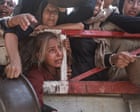
In a region known for its history of conflict, recent developments in Gaza call for a moment of reflection and calm. As both humanitarian and political efforts strive to alleviate the distress of the residents, there’s a palpable sense of urgency intertwined with hope for a peaceful resolution.
The humanitarian situation in Gaza has been brought to the forefront with recent incidents highlighting the dire conditions faced by its inhabitants. Over the past few days, Israeli airstrikes and gunfire have tragically claimed the lives of at least 57 people. These unfortunate events unfolded as residents, driven by desperation, gathered close to the Zikim crossing, hoping to receive much-needed aid. The blockade on the territory has led to mass hunger, making these aid missions a lifeline for many.
Amidst this environment, Israel has taken steps to provide humanitarian relief through airdrops over Gaza. While these efforts are critical, they serve as a temporary measure in the face of a deepening starvation crisis. Philippe Lazzarini, UNRWA Commissioner-General, remarked on the limitations of these airdrops, acknowledging that while they offer temporary relief, the broader challenge of malnutrition and hunger persists. This underscores the importance of seeking long-term solutions that go beyond immediate aid.
The political landscape adds another layer of complexity to the situation. Recent reports indicate that discussions geared towards a ceasefire have reached an impasse. Israeli officials have chosen to withdraw from the talks in Doha, signaling a shift towards exploring alternative options. This decision reflects the dynamic nature of peace processes in the region, where negotiating parties continue to search for sustainable pathways towards ending hostilities.
Despite these challenges, there’s a continuous push from various humanitarian organizations to address the conditions in Gaza. Efforts are being made to ensure that aid reaches those most in need, highlighting the resilience and dedication of those working on the ground. Their work is not just about delivering food and medical supplies but also about providing hope and fostering community resilience during trying times.
For the people of Gaza, the daily struggle is a testament to their resilience and perseverance. While external assistance remains critical, the enduring spirit of the locals plays a pivotal role in navigating the ongoing difficulties. This resilience is an integral part of the social fabric, helping communities endure and adapt amid adversities.
In reflecting on these events, it is essential to approach the stories from Gaza with empathy and understanding, recognizing the human element behind the headlines. The journey towards peace and stability may be complex, but the collective efforts of individuals, organizations, and nations can create meaningful change, offering a glimmer of hope for those affected.
As the situation unfolds, it is the shared responsibility of the international community to support pathways that lead to lasting peace and prosperity for Gaza. By approaching the challenges with compassion and understanding, there is potential for creating a future where the residents of Gaza can thrive in peace and security.
Source: {link}
